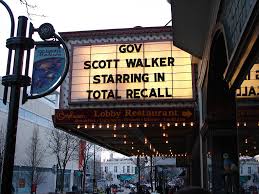I had to double check several news sources when I first saw this because I could not believe my eyes. But it’s for reals, folks.
Judge Rudolph Randa from the U.S. District Court for Wisconsin in Milwaukee has issued a stunning absolutist “money=speech” ruling that is the most sweeping overreach by a federal judge in a prosecution I believe I have ever seen. (Randa was appointed to the bench in 1992 by President George H.W. Bush). It takes a lot to shock me, but this did it.
The Milwaukee Journal Sentinel reports, Federal judge halts John Doe probe into Walker recall:
 A federal judge ordered a halt Tuesday to the John Doe investigation into campaign spending and fundraising by Gov. Scott Walker’s campaign and conservative groups, saying the effort appeared to violate one of the group’s free speech rights.
A federal judge ordered a halt Tuesday to the John Doe investigation into campaign spending and fundraising by Gov. Scott Walker’s campaign and conservative groups, saying the effort appeared to violate one of the group’s free speech rights.
In his 26-page decision (.pdf), U.S. District Judge Rudolph Randa in Milwaukee told prosecutors to immediately stop the long-running, five-county probe into possible illegal coordination between Walker’s campaign, the Wisconsin Club for Growth and a host of others during the 2011 and 2012 recall elections.
“The (Wisconsin Club for Growth and its treasurer) have found a way to circumvent campaign finance laws, and that circumvention should not and cannot be condemned or restricted. Instead, it should be recognized as promoting political speech, an activity that is ‘ingrained in our culture,'” Randa wrote, quoting from a recent U.S. Supreme Court decision.
He ordered an immediate halt to the investigation, the return of all property seized during it, and the destruction of any information and materials gained in the investigation. He told the Wisconsin Club for Growth it did not need to cooperate with prosecutors in any way.
Special prosecutor Francis Schmitz, who was leading the investigation, said late Tuesday he expects to challenge the decision by appealing to the 7th Circuit Court of Appeals in Chicago.




